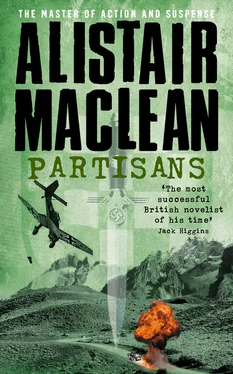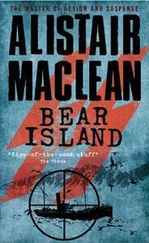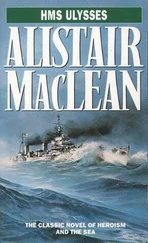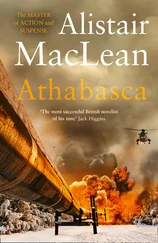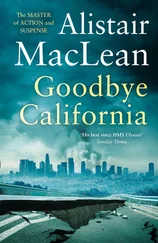The wait was even shorter than he had expected. Less than five minutes had passed when a German officer strode briskly along the corridor, turned left, knocked on a door, knocked again, this time peremptorily, rattled the handle then reappeared, frowning heavily. There came the creaking and clanking of the ancient elevator, a silence, more creaking and clanking, then the officer again hove into sight this time with the concierge, who had a key in his hand.
When ten minutes had passed with no sign of either man Petersen went inside, eased his way along the passage and peered round the corner to his left. Halfway along the corridor stood the concierge, obviously on guard. Just as obviously, he was an experienced campaigner prepared for any contingency for, as Petersen watched, he produced a hip flask from his pocket and was still savouring the contents, his eyes closed in bliss, when Petersen clapped him heartily on the shoulder.
‘You keep a good watch, my friend.’
The concierge coughed, choked, spluttered and tried to speak but his larynx wasn’t having any of it. Petersen looked past him and through the doorway.
‘And good evening to you, Colonel Lunz. Everything is in order, I trust?’
‘Ah, good evening.’ Lunz was almost a look-alike for Petersen himself, medium height, broad shoulders, aquiline features, grey eyes and thin black hair: an older version, admittedly, but nevertheless the resemblance was startling. He didn’t seem in any way put out. ‘I’ve just this moment arrived and—’
‘Ah, ah, Colonel.’ Petersen wagged a finger. ‘Officers, whatever their nationality, are officers and gentlemen the world over. Gentlemen don’t tell lies. You’ve been here for exactly eleven minutes. I’ve timed you.’ He turned to the still red-faced and gasping concierge who was making valiant efforts to communicate with them and clapped him encouragingly on the back. ‘You were trying to say something?’
‘You were out.’ The convulsions were easing. ‘I mean, you were in, but I saw you go out. Eleven minutes, you said? I didn’t see—I mean, your key—’
‘You were drunk at the time,’ Petersen said kindly. He bent, sniffed and wrinkled his nose. ‘You still are. Be off. Send us a bottle of brandy. Not that tearful rot-gut you drink: the French cognac you keep for the Gestapo. And two glasses— clean glasses.’ He turned to Lunz. ‘You will, of course, join me, my dear Colonel?’
‘Naturally.’ The Colonel was a hard man to knock off balance. He watched Petersen calmly as he took off his coat and threw it on the bed, lifted an eyebrow and said: ‘A sudden chill snap outside, yes?’
‘Rome? January? No time to take chances with one’s health. It’s no joke hanging about those fire escapes, I can tell you.’
‘So that’s where you were. I should have exercised more care, perhaps.’
‘No perhaps about your choice of lookout.’
‘True.’ The Colonel brought out a briar pipe and began to fill it. ‘I hadn’t much choice.’
‘You sadden me, Colonel, you really do. You obtain my key, which is illegal. You post a guard so that you won’t be discovered breaking the law yet again. You ransack my belongings—’
‘Ransack?’
‘Carefully examine. I don’t know what kind of incriminating evidence you were expecting to find.’
‘None, really. You don’t strike me as the kind of man who would leave—’
‘And you had me watched earlier tonight. You must have done, otherwise you wouldn’t have known that I had been out earlier without a coat. Saddens? It shocks. Where is this mutual trust that should exist between allies?’
‘Allies?’ He struck a match. ‘I hadn’t thought about it very much in that way.’ Judging by his expression, he still wasn’t thinking very much about it in that way.
‘And more evidence of mutual trust.’ Petersen handed over the wallet he had taken from the young lieutenant, together with a revolver. ‘I’m sure you know him. He was waving his gun around in a very dangerous fashion.’
‘Ah!’ Lunz looked up from the papers. ‘The impetuous young Lieutenant Wintermann. You were right to take this gun from him, he might have done himself an injury. From what I know of you I assume he’s not resting at the bottom of the Tiber?’
‘I don’t treat allies that way. He’s locked up in a jeweller’s shop.’
‘Of course.’ Lunz spoke as if he had expected nothing else. ‘Locked up. But surely he can—’
‘Not the way I tied him up. You not only sadden me, Colonel, you insult me. Why didn’t you give him a red flag to wave or a drum to beat? Something that would really attract my attention.’
Lunz sighed. ‘Young Hans is well enough in a tank but subtlety is not really his métier. I did not, by the way, insult you. Following you was entirely his own idea. I knew what he was up to, of course, but I didn’t try to stop him. For hardly won experience a sore head is little enough to pay.’
‘He hasn’t even got that. An ally, you see.’
‘Pity. It might have reinforced the lesson.’ He broke off as a knock came to the door and the concierge entered bearing brandy and glasses. Petersen poured and lifted his glass.
‘To Operation Weiss.’
‘ Prosit .’ Lunz sipped appreciatively. ‘Not all Gestapo officers are barbarians. Operation Weiss? So you know? You’re not supposed to.’ Lunz didn’t seem at all put out.
‘I know lots of things that I’m not supposed to.’
‘You surprise me.’ Lunz’s tone was dry. He sipped some more brandy. ‘Excellent, excellent. Yes, you do have a penchant for picking up unconsidered—and classified—trifles. Which leads to your repeated use of the world “ally”. Which leads, in turn, to what you possibly regard as our undue interest in you.’
‘You don’t trust me?’
‘You’ll have to improve on that injured tone of yours. Certainly we trust you. Your record— and it is a formidable one—speaks for itself. What we—and especially myself—find difficult to understand is why such a man with such a record aligns himself with—well, I’m afraid I have to say it—with a quisling. I do not hurt your feelings?’
‘You’d have to find them first. I would remind you that it was your Führer who forced our departed Prince Regent to sign this treaty with you and the Japanese two years ago. I assume he’s the quisling you’re talking about. Weak, certainly, vacillating, perhaps cowardly and no man of action. You can’t blame a man for those things: nature’s done its worst and there’s nothing we can do about nature. But no quisling—he did what he thought was best for Yugoslavia. He wanted to spare it the horrors of war. “ Bolje grob nego rob ”. You know what that means?’
Lunz shook his head. ‘The intricacies of your language—’
‘ “Better death than slavery”. That’s what the Yugoslav crowds shouted when they learned that Prince Paul had acceded to the Tripartite Pact. That’s what they shouted when he was deposed and the pact denounced. What the people didn’t understand was that there was no “ nego ”, no “than”. It was to be death and slavery as they found out when the Führer, in one of his splendid rages, obliterated Belgrade and crushed the army. I was one of those who were crushed. Well, nearly.’
‘If I might have some more of that excellent cognac.’ Lunz helped himself. ‘You don’t seem greatly moved by your recollections.’
‘Who can live with all his yesterdays?’
‘Nor by the fact that you find yourself in the unfortunate position of having to fight your own countrymen.’
‘Instead of joining them and fighting you? War makes for strange bed-fellows, Colonel. Take yourselves and the Japanese, for instance. Hardly entitles you to a holier-than-thou attitude.’
Читать дальше
